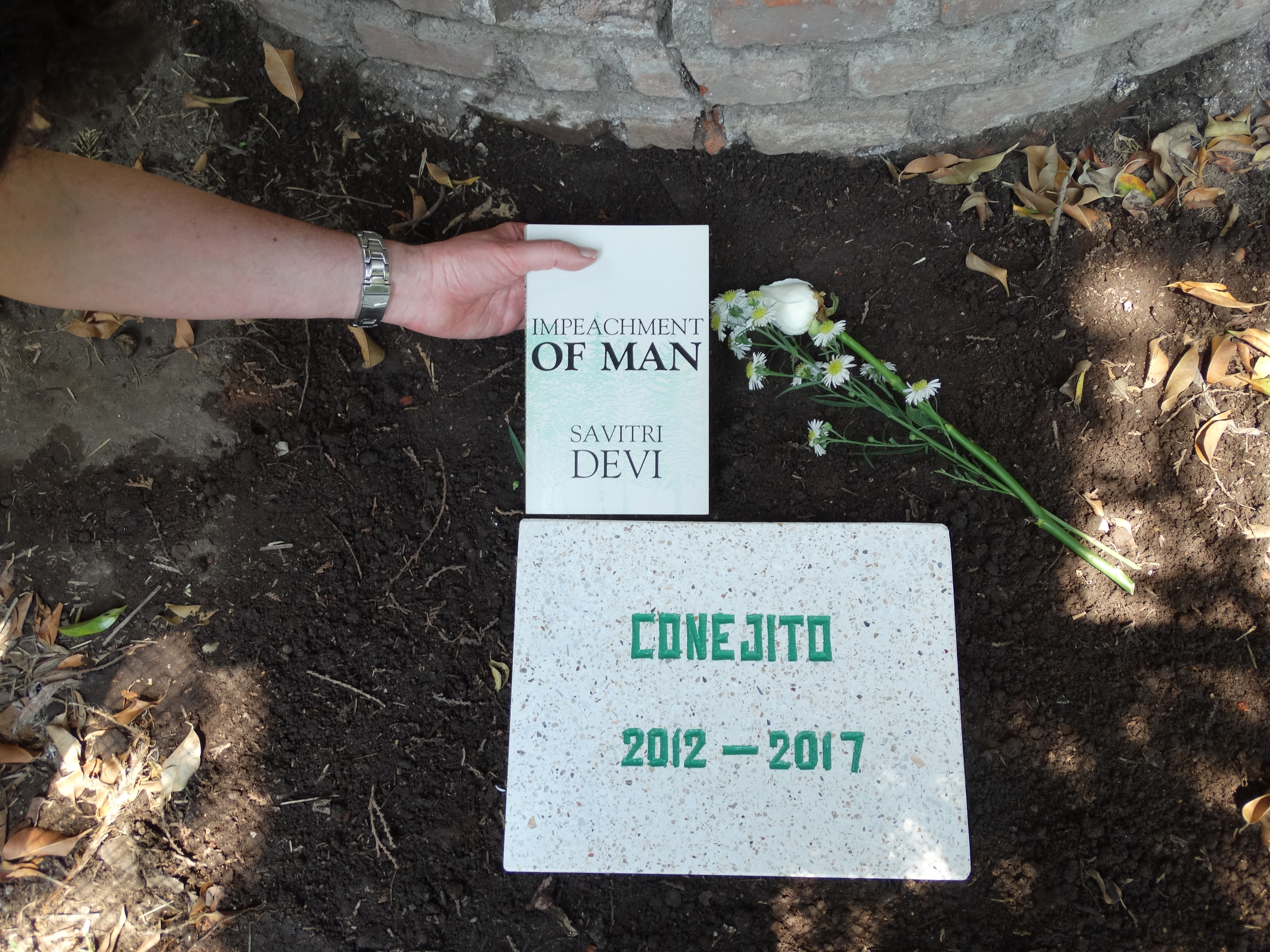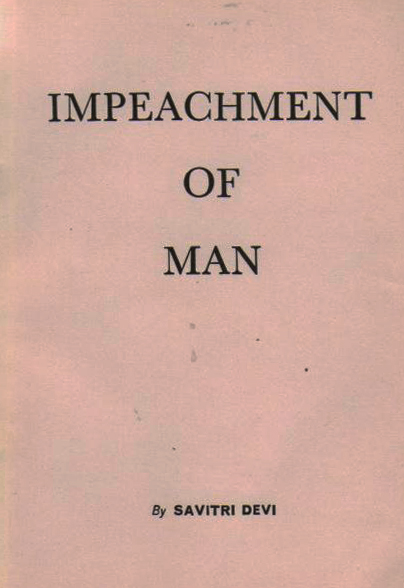by Savitri Devi

Excerpted from Chapter I: Man-centered creeds
Of all moral ideas, that of our positive duties towards creatures of other species (animals, and even plants) is perhaps the slowest to impress itself upon the human mind. It seems as though it were alien to the spirit no less than to the letter of all successful international religions, save Buddhism. And one who is fully conscious of its importance—one who recognizes in it the expression of a fundamental moral truth—may as well wonder in amazement how creeds that omit to mention it altogether (let alone to stress it) have yet been able to secure themselves such numerous followings, and, what is more, how their narrow conception of love is still claiming to be “the highest,” and how that claim rouses no protest on behalf of the better men. This is, no doubt, enough to lead him to gloomy conclusions concerning the inherent coarseness, selfishness and ugliness of human nature in general.
Theoretically, the man-centered creeds and philosophies sway the whole world minus the greater part of India, Burma, Ceylon, and the countries of the Far East to the extent that these have actually come under the influence of Buddhism. That does not mean that there are no individuals in England and America, in Germany and Russia, who look upon all life as sacred, and to whom the infliction of pain upon animals is even more odious that that upon human beings. That does not mean, either, that all people who, in India and elsewhere, are catalogued in the census reports Hindus, Buddhists or Jains are, in fact, paragons of active kindness towards all living creatures. Far from it!
But we notice that, from those very civilizations in which cannibalism was generally admitted, sprang, now and then, a few individuals—an infinitesimal, powerless minority—whom the custom disgusted. And from amidst a world in which slavery was considered as a necessary evil by respectable people, sprang a few individuals who condemned it, either openly or secretly, in the name of human dignity.
And we see that it is the opinion of those better individuals that finally triumphed. One of the best among the ancient Mexicans, King Nezahualcóyotl, tried in vain, in the fifteenth century A.D. to put a stop to human sacrifices within his realm. But today, the murder of a man, be it even as an offering to a deity, is considered a criminal offence and would be punished by law nearly all over the world. The minority, in Mexico, became a majority—and would have become so, apparently, anyhow, even if no Christian adventurers had ever landed there. Minorities often do, with time, become majorities.
To those to whom the age-old exploitation of animals seems normal just because it is practically universal and as old as man, we shall say that there are today people who strongly disapprove of it—never mind if they be but a handful scattered among millions of human beings still at a more barbaric stage of evolution.
There are men and women—and the author of this book is one of them—who, at the sight of one of their contemporaries eating a beefsteak in a restaurant or a chicken sandwich in a railway carriage, feel no less a disgust than some rare Mexicans of old possibly did when they saw the cooked limbs of a prisoner of war served up on gold and silver plates at State banquets. There are men and women today, few indeed as they may be, who are as much saddened when they see a tired horse drawing a cart as certain other “queer” people might have been once, when they met a slave cutting wood or grinding corn for his owner under the supervision of a merciless taskmaster.
Those few are now “dreamers,” “eccentric folk,” “cranks”—like all pioneers. But who can tell whether their opinion will never become that of average man, and their principles the law of the world? If not… then we believe that the human race is not worth bothering one’s head about at all.
All the splendour of the material world; all the grace, strength and loveliness of millions of beasts, birds, fishes, trees and creepers; the majesty of the snow-clad mountains, the beauty of the unfurling waves—all that and much more—is not worth, in God’s eyes, the immortal soul of a human imbecile—so they say, at least.
That is why the hunting of tigers and deer, the butchering of innocent woolly lambs, so glad to live, the dissecting of pretty white guinea pigs or of intelligent dogs, are not “sins” according to the man-centered faiths—not even if they imply the most appalling suffering. But the painless chloroforming of worthless human idiots is a “crime.” How could it be otherwise? They have two legs, no tail, and an immortal soul. However degenerate they be, they are men.
I cannot help here recalling the answer of a French medical student, a member of the “Christian Federation of Students,” whom I has asked, twenty- five years ago, how he could reconcile his religious aspirations with his support of vivisection. “What conflict can there be between the two?” said he; “Christ did not die for guinea pigs and dogs.” I do not know what Christ would actually have said to that. The fact remains that, from the point of view of historical Christianity, the boy was right. And his answer is enough to disgust one forever with all man-centered creeds.
The God of the Christians, the God of Islam, and the God of most of those later Free Thinkers who are not out and out atheists, never succeeded in shaking off completely the habits he once had when he was but the patron deity of a few tribes of desert wanderers, slaves in the land of the Pharaohs. He was able to raise himself from the rank of a national god to that of a God of all humanity.
But that is all. His love seems to have been spent out in its extension from the “chosen People” of Israel to the Chosen Species of mankind. He had not in him the urge to broaden his fatherly feelings still beyond those narrow limits. It never occurred to him how narrow they were in fact and how irrational, how mean, how all-too-human that childish preference for man was, in a God that is supposed to have made the Milky Way.
The great creeds of the world west of India remained man-centered, it would seem, because they never could free themselves entirely from the marks of their particular tribal origin among the sons of Abraham. The Jews never were a race that one could accuse of giving animals too great a place in its everyday life and thoughts.
Christ, who came “to fulfil” the Jewish law and prophecies (not to introduce into the world a different, more rational, and truly kindlier trend of thought) appears never to have bothered his head about the dumb creatures.
We speak, of course, of Christ as the Christian Gospels present him to us. That Christ—we have no means whatsoever of finding out whether a “truer” one ever lived—never performed a miracle, never even intervened in a natural manner, in favour of any beast, as his contemporary, Apollonius of Tyana, not to speak of any more ancient and illustrious Master such as the blessed Buddha, is supposed to have done. He never spoke of God’s love for animals save to assert that He loved human beings a fortiori, much more. He never mentioned nor implied man’s duties towards them, though he did not omit to mention, and to stress, other duties.
If the Gospels are to be taken as they are written, then his dealings with nonhuman sentient creatures consisted, on one occasion, of sending some evil spirits into a herd of swine, that they might no longer torment a man, and, another time, of making his disciples, who were mostly fishermen by profession, as every one knows, catch an incredible quantity of fish in their nets.
In both cases his intention was obviously to benefit human beings at the expense of the creatures, swine or fish. As for plants, it is true that he admired the lilies of the fields; but it is no less true that he cursed a fig tree for not producing figs out of season and caused it to wither, so that his disciples might understand the power of faith and prayer.
Fervent English or German Christians, who love animals and trees, may retort that nobody knows exactly all that Jesus actually said, and that the gospels contain the story of only a few of his numberless miracles. That may be. But as there are no records of his life save the Gospels, we have to be content with what is revealed therein. Moreover, Christianity as an historical growth is centered around the person of Christ as the Gospels describe him.
To say, as some do, that every word of the Christian Gospels has an esoteric meaning, and that “swine” and “fishes” and the “barren fig tree” are intended there to designate anything but real live creatures, would hardly make things better. It would still be true that kindness to animals is not spoken of in the teaching of Jesus as it has come down to us, while other virtues, in particular kindness to people, are highly recommended. And the development of historical Christianity would remain, in all its details, what we know it to be.
There has been, it is true, in the West, in recent years—nay, there is, for nothing which is in harmony with the Laws of Life can ever be completely suppressed—a non-Christian (one should even say an anti-Christian) and definitely more than political school of thought which courageously denounced this age-old yet erroneous tradition, and set up a different scale of values and different standards of behaviour. It accepted the principle of the rights of animals, and set a beautiful dog above a degenerate man.
It replaced the false ideal of “human brotherhood,” by the true one of a naturally hierarchised mankind harmoniously integrated into the naturally hierarchised Realm of life, and, as a logical corollary of this, it boldly preached the return to the mystic of genuine nationalism rooted in healthy race-consciousness, and the resurrection of the old national gods of fertility and of battle (or the exaltation of their philosophical equivalents) which many a Greek “thinker” and some of the Jewish prophets themselves had already discarded—politely speaking: “transcended”—in decadent Antiquity.
And its racialist values, solidly founded upon the rock of divine reality, and intelligently defended as they were, in comparison with the traditional man-centered ones inherited, in Europe, from Christianity, are, and cannot but remain, whatever may be the material fate of their great Exponent and of the regime he created, the only unassailable values of the contemporary and future world. But it is, for the time being, a “crime” to mention them, let alone to uphold them—and their whole recent setting—in broad daylight.
The opposite ideologies, more in keeping with the general tendencies of modern Free Thought from the Renaissance onwards, have only broken off apparently with the man-centered faiths. In fact, our international Socialists and our Communists, while pushing God and the supernatural out of their field of vision, are more Christian-like than the Christian Churches ever were.
He who said, “Love they neighbour as thyself has to-day no sincerer and more thorough disciples than those zealots whose foremost concern is to give every human being a comfortable life and all possibilities of development, through the intensive and systematic exploitation by all of the resources of the material world, animate an inanimate, for man’s betterment. Communism, that new religion—for it is a sort of religion—exalting the common man; that philosophy of the rights of humanity as the privileged species, is the natural logical outcome of real Christianity.
It is the Christian doctrine of the labour of love for one’s neighbours, freed from the overburdening weight of Christian theology. It is real Christianity, minus priesthood—which Christ thoroughly disliked—and minus all the beliefs of the Church concerning the human soul and all the mythology of the Bible.
In other words, the rejection of the belief in the supernatural, and the advent of a scientific outlook upon the material world, has not in the least broadened the Westerners’ moral outlook. And, unless they be consistent Racialists, worshippers of hierarchised Life, those who today openly proclaim that civilization can well stand without its traditional Christian (or Muslim) background, stick to a scale of values that proceeds, either from a yet narrower love than that preached in the name of Christ or of Islam, (from the love of one’s mere individual self and family) or, at most, from the same love—not from a broader one; not from a true universal love.
The generous “morality” derived from modern Free Thought is no better than that based upon the time-honoured man-centered creeds that have their origin in Jewish tradition.
It is a morality centered—like the old Chinese morality, wherever true Buddhism and Taoism have not modified it—around “the dignity of all men” and human society as the supreme fact, the one reality that the individual has to respect and to live for; a morality which ignores everything of man’s affiliation with the rest of living nature, and looks upon sentient creatures as having no value except inasmuch as they are exploitable by man for the “higher” purpose of his health, comfort, clothing, amusement, etc. The moral creed of the Free Thinker today is a man-centered creed—no less than that of Descartes and Malebranche and, later on, of the idealists of the French Revolution, and finally of Auguste Comte.
We believe that there is a different way of looking at things—a different way, in comparison with which this man-centered outlook appears as childish, mean and barbaric as the philosophy of any man-eating tribe might seem, when compared with that of the Christian saints, or even of the sincerest ideologists of modern international Socialism or Communism.
 Apparently, these commenters suffer from human megalomania: that humans are superior to animals, or that humans have souls. I doubt that they have read with due attention the books of William Pierce, or Impeachment of Man by Savitri Devi. Already in January 2015 I had published an entry with the title of ‘Animals’, and as epigraphs I chose some words from Pierce and Hunter Wallace. The latter, as a Christian, continues to believe in the existence of the human ‘soul’. But despite this he acknowledges that whites deserve to be committed to the Fruitcake Hospital:
Apparently, these commenters suffer from human megalomania: that humans are superior to animals, or that humans have souls. I doubt that they have read with due attention the books of William Pierce, or Impeachment of Man by Savitri Devi. Already in January 2015 I had published an entry with the title of ‘Animals’, and as epigraphs I chose some words from Pierce and Hunter Wallace. The latter, as a Christian, continues to believe in the existence of the human ‘soul’. But despite this he acknowledges that whites deserve to be committed to the Fruitcake Hospital:

